新职业英语素质篇unit2
新职业英语职业综合英语Unit2Office

清晰表达
使用简洁、明确的语言,避免歧义和 误解。
倾听技巧
书面沟通
掌握电子邮件、报告等书面沟通技巧。
积极倾听,理解他人的观点和需求。
Team collaboration skills
团队合作
尊重团队成员,共同解决问题和 完成任务。
分工与协作
明确分工,发挥各自优势,协同工 作。
有效沟通
促进团队内部的有效沟通,减少误 解和冲突。
• Job-related content: Learners will learn about common work-related topics such as office equipment, time management, and project management.
• Cross-cultural awareness: Learners will develop their understanding of different cultural backgrounds and ways of communication to enhance their ability to work effectively with international colleagues.
Efficient team cases
• Highly motivated and engaged team members
Efficient team cases
Team Z
Consistent follow-up on action items and decisions
Regularly reviews progress and provides feedback
新职业英语2_Unit2
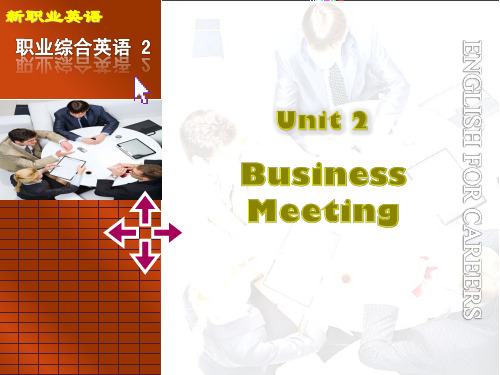
ReadTAe-4xitng A
I used to be the disengaged participant—one who had good ideas about how to solve a problem, but didn’t contribute. I now take a more active role, aiming to make meetings more effective. Here are three simple principles I use. First, whoever calls a meeting should be explicit about its objectives. This means specifying tangible goals and assigning responsibilities. Second, everyone should think carefully about the costs of a meeting: How many participants are really needed? How long should the meeting last? Finally, after meetings, assign credit or blame to the person in charge. If people have records of leading ineffective meetings, they are not allowed to lead future sessions.
Wa rm1
3,5,6,8,9,10 2, 4, 7 1,11, 12
ReadRngeiaAdni g A
Text Task 1 Task 2 Business Know-how
新职业英语2-unit

Reading comprehension exercises
题目示例
阅读以下短文,然后回答问题
Once upon a time, there was a little girl named Alice. She was very curious and one day, she followed a white rabbit into a magical world. She had many adventures and met many interesting characters, like the Cheshire Cat and the Mad Hatter. Finally, she managed to find her way back home.
This unit delves into the fundamental concepts of finance and accounting, such as financial statement analysis, investment decisions, and managerial accounting. It equips students with the knowledge and skills necessary for effective financial decisionmaking and accounting practices.
Multiple choice exercises
D. He went to the mountains. 2. What was the weather like yesterday?
Multiple choice exercises
A. Cloudy
新职业英语基础篇第三版职业综合英语2unit2课件
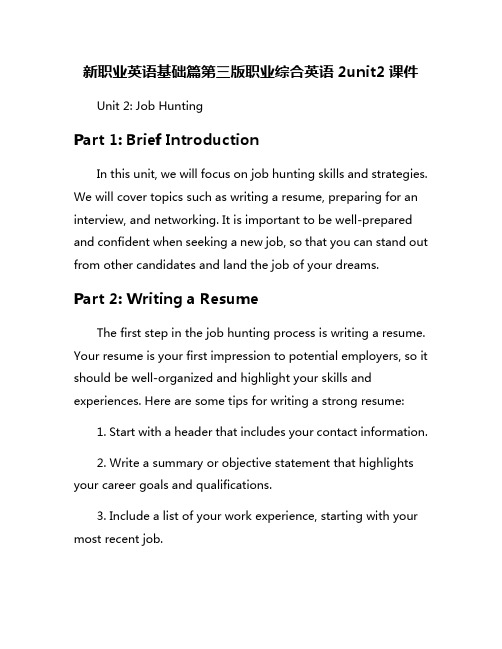
新职业英语基础篇第三版职业综合英语2unit2课件Unit 2: Job HuntingPart 1: Brief IntroductionIn this unit, we will focus on job hunting skills and strategies. We will cover topics such as writing a resume, preparing for an interview, and networking. It is important to be well-prepared and confident when seeking a new job, so that you can stand out from other candidates and land the job of your dreams.Part 2: Writing a ResumeThe first step in the job hunting process is writing a resume. Your resume is your first impression to potential employers, so it should be well-organized and highlight your skills and experiences. Here are some tips for writing a strong resume:1. Start with a header that includes your contact information.2. Write a summary or objective statement that highlights your career goals and qualifications.3. Include a list of your work experience, starting with your most recent job.4. List your education, including any degrees or certifications you have obtained.5. Include any relevant skills or qualifications that make youa strong candidate for the job.6. End with a list of references who can vouch for your skills and experiences.Part 3: Preparing for an InterviewOnce you have submitted your resume and been called for an interview, it is important to prepare thoroughly. Here are some tips for preparing for an interview:1. Research the company and the job position you are applying for.2. Practice answering common interview questions.3. Dress appropriately for the interview.4. Bring a copy of your resume and any other relevant documents.5. Prepare questions to ask the interviewer.6. Follow up with a thank-you note after the interview.Part 4: NetworkingNetworking is an important part of the job hunting process. By connecting with industry professionals and building relationships, you can increase your chances of finding job opportunities. Here are some tips for networking:1. Attend industry events and job fairs.2. Join professional organizations related to your field.3. Connect with professionals on LinkedIn.4. Reach out to former colleagues and classmates for job leads.5. Be proactive in seeking out networking opportunities.Part 5: ConclusionJob hunting can be a challenging process, but with the right skills and strategies, you can increase your chances of finding a job that is a good fit for you. By writing a strong resume, preparing for interviews, and networking effectively, you can stand out from other candidates and land the job of your dreams. Good luck!。
新职业英语第二册unit2

•
Some of this confusion will spill over into the G20 summit .
这种混乱在一定程度上会蔓延至G20峰会。
2. chime [tʃaim] in 插话 e.g. The artist’s illustrations chime in perfectly with the text.
(译文)
这种会议的问题部分在于会议召集人没有明确的 目标或议程,也没有布置好会前的准备工作,而是 寄希望于奇迹发生,带来解决问题的方法。当然, 奇迹从未发生。
Part of the problem at such meetings is that
the leader has not set clear _________ or an objectives agenda, and didn’t _______ pre-meeting assign
Tran: 他的眼神流露出超然的态度。 He had a disengaged look in his eyes.
12. aim to +动词原形
vt. 计划,打算;目标在于…;以…为目标
• Now , many companies aim to release new films at the same time around the world . 而现在,许多公司都争取在世界范围内同时 发布新电影。 ◆aim for 瞄准;以…为目标 • Always aim for achievement and forget about success . - ---Helen Hayes . 永远要争取做出成就,别多考虑成功。----海 伦海丝。
新职业英语2unit2
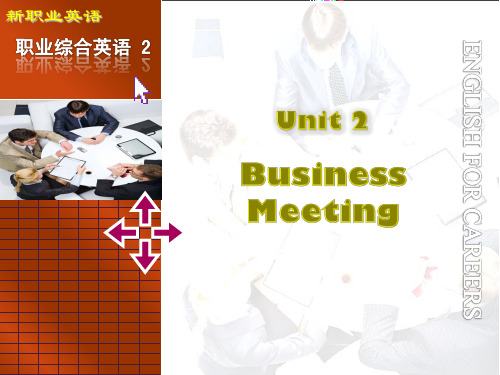
ReadTAe-2xitng A
2 Part of the problem at such meetings is that the leader has not set clear objectives or an agenda, and didn’t assign pre-meeting preparation tasks. Instead, the leader seems to hope that magic will occur, producing solutions to the problems. Of course, that doesn’t happen.
ReadTAe-4xitng A
4 I used to be the disengaged participant—one who had good ideas about how to solve a problem, but didn’t contribute. I now take a more active role, aiming to make meetings more effective. Here are three simple principles I use. First, whoever calls a meeting should be explicit about its objectives. This means specifying tangible goals and assigning responsibilities. Second, everyone should think carefully about the costs of a meeting: How many participants are really needed? How long should the meeting last? Finally, after meetings, assign credit or blame to the person in charge. If people have records of leading ineffective meetings, they are not allowed to lead future sessions.
新职业英语--IT英语 Unit 2
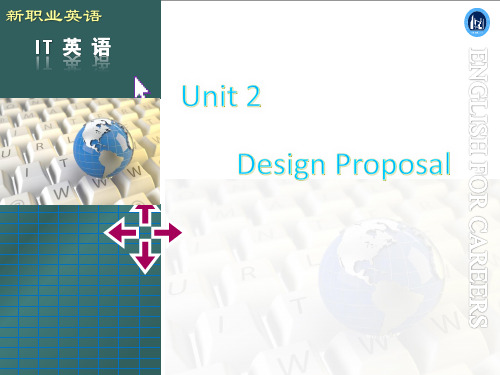
< Back
Next >
Home
Unit 2 Design Proposal
Reading A
Para. 4 Perhaps the most frequent use of a LAN is to connect users to the Internet with only one connected router. In modern times, we use broadband cable or DSL modems to join to the Internet, and it
< Back
Next >
Home
Unit 2 Design Proposal
Reading A
Task 2 Read the passage and tick the facts mentioned in the passage about LAN.
history definition of LAN technical specifications Internet vs. Intranet commupanses of surfing the Net procedures of LAN set-up
Different people may define happiness differently.
< Back
Next >
Home
Unit 2 Design Proposal
< Back
Next >
Home
Unit 2 Design Proposal
Reading A
Para. 3 More important LANs have extra lines or other backup protocols. In networked computers, the most popular communication protocol is TCP/IP. Smaller LANs may be temporary and used between friends to play computer games over the network. Via the network, users can view and share files, make changes to data on other computers if it is possible, play movies or music on many computers at once, chat with instant messaging, send emails to each other, play games, and so on.
新职业英语基础篇第三版职业综合英语2unit2课件
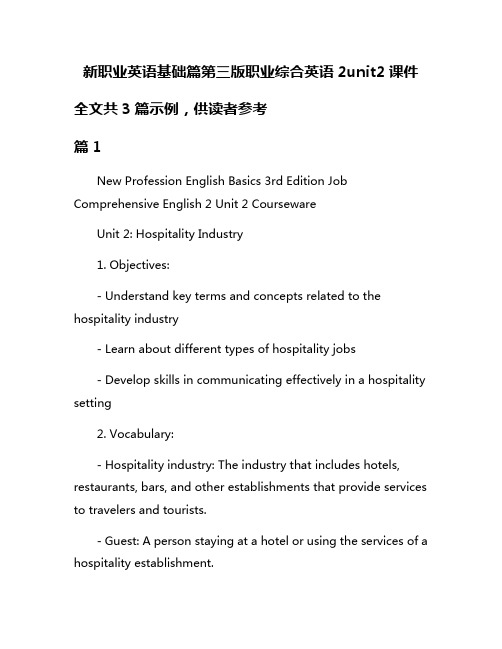
新职业英语基础篇第三版职业综合英语2unit2课件全文共3篇示例,供读者参考篇1New Profession English Basics 3rd Edition Job Comprehensive English 2 Unit 2 CoursewareUnit 2: Hospitality Industry1. Objectives:- Understand key terms and concepts related to the hospitality industry- Learn about different types of hospitality jobs- Develop skills in communicating effectively in a hospitality setting2. Vocabulary:- Hospitality industry: The industry that includes hotels, restaurants, bars, and other establishments that provide services to travelers and tourists.- Guest: A person staying at a hotel or using the services of a hospitality establishment.- Front desk: The area in a hotel where guests check in and out, make reservations, and ask for information.- Concierge: A hotel employee who assists guests with various services, such as booking tickets, making restaurant reservations, and arranging transportation.- Housekeeping: The department in a hotel responsible for cleaning and maintaining guest rooms and public areas.- Room service: The service in a hotel that delivers food and beverages to guests in their rooms.- Check-in/check-out: The process of arriving at and departing from a hotel.- Amenities: Extra features and services offered by a hotel, such as a swimming pool, gym, or spa.- Hospitality skills: The skills needed to provide excellent service to guests, such as communication, problem-solving, and teamwork.3. Jobs in the Hospitality Industry:- Hotel manager: Oversees the day-to-day operations of a hotel, including staff management, guest services, and budgeting.- Front desk agent: Greets guests, checks them in and out, and provides information and assistance during their stay.- Concierge: Assists guests with booking activities, making reservations, and arranging transportation.- Housekeeper: Cleans and maintains guest rooms and public areas in a hotel.- Bartender: Prepares and serves alcoholic and non-alcoholic beverages to guests at a bar or restaurant.- Waitstaff: Takes orders, serves food and beverages, and provides excellent customer service in a restaurant.- Chef: Prepares and cooks meals in a restaurant kitchen, creating delicious dishes for guests to enjoy.- Event planner: Organizes and coordinates events, such as weddings, conferences, and parties, for clients.4. Communication Skills in the Hospitality Industry:- Greeting guests: When a guest arrives, it's important to greet them warmly and make them feel welcome.- Listening: Listening carefully to guests' needs and requests is essential for providing excellent service.- Problem-solving: Handling guest complaints and resolving issues in a timely and effective manner is key to maintaining guest satisfaction.- Teamwork: Working together with colleagues to ensure that guests receive the best possible service and experience.5. Conclusion:The hospitality industry offers a wide range of exciting and rewarding career opportunities for those who are passionate about providing excellent service to guests. By developing your communication skills, building your knowledge of the industry, and gaining experience in various hospitality roles, you can succeed in this dynamic and fast-paced field. Good luck!篇2New Professional English is a series of textbooks that are designed to improve English language skills for specific professions. The third edition of the Basic Level of New Professional English introduces students to a wide range of vocational topics and helps them develop the English language skills necessary to communicate effectively in a professional setting.One of the units in the textbook is Unit 2, which focuses on the topic of Career Paths. This unit helps students explore different career options, discuss their career aspirations, and learn vocabulary related to professions and job interviews. The lesson includes activities such as reading texts about different professions, listening to interviews with professionals, androle-playing job interviews.The lesson begins with a warm-up activity to introduce the topic of careers and get students thinking about their own career goals. This is followed by a reading activity where students learn about various professions and career paths. The students then practice using the new vocabulary in speaking activities where they discuss their own career aspirations and share information about different professions.In the listening activity, students listen to interviews with professionals from different fields and answer questions about their career paths and experiences. This helps students develop their listening skills and learn more about the realities of working in different professions.The unit concludes with a role-playing activity where students simulate job interviews and practice their speakingskills. This allows students to put into practice the vocabulary and language structures they have learned throughout the unit.Overall, Unit 2 of the New Professional English Basic Level textbook provides students with a solid foundation in English language skills related to careers and professions. By engaging in a variety of activities, students are able to improve their reading, listening, speaking, and vocabulary skills in a practical and relevant context. This prepares them for success in their chosen profession and helps them communicate effectively in a professional setting.篇3Unit 2: Telecommunications1. IntroductionThis unit focuses on the telecommunications sector, which plays a vital role in connecting people and technology. We will learn about the history and development of telecommunications, as well as the different types of communication technologies and services available today.2. Historical OverviewTelecommunications has a long history dating back to the invention of the telegraph in the 19th century. Over time, new technologies such as the telephone, radio, television, and internet have revolutionized communication. Today, we have a wide range of digital communication tools such as smartphones, social media, and video conferencing.3. Telecommunications InfrastructureTelecommunications infrastructure refers to the physical components and networks that enable communication to take place. This includes cables, satellites, towers, and data centers. The infrastructure is constantly evolving to meet the growing demands for faster and more reliable communication services.4. Types of Telecommunications ServicesTelecommunications services can be broadly categorized into three main types: fixed-line, mobile, and internet services. Fixed-line services use landlines to connect calls, while mobile services use cellular networks to enable wireless communication. Internet services allow users to access the web, send emails, and participate in online activities.5. Emerging TechnologiesThe telecommunications sector is constantly evolving with the introduction of new technologies such as 5G, IoT (Internet of Things), and AI (Artificial Intelligence). These technologies are shaping the future of communication by offering faster speeds, greater connectivity, and improved efficiency.6. Career OpportunitiesThere are numerous career opportunities in the telecommunications sector, including network engineers, software developers, data analysts, and customer service representatives. As technology continues to advance, the demand for skilled professionals in this field is expected to grow.7. ConclusionThe telecommunications sector is a dynamic and fast-paced industry that is constantly evolving to meet the demands of modern communication. By understanding the history, infrastructure, services, and emerging technologies in telecommunications, we can prepare ourselves for a successful career in this exciting field.。
- 1、下载文档前请自行甄别文档内容的完整性,平台不提供额外的编辑、内容补充、找答案等附加服务。
- 2、"仅部分预览"的文档,不可在线预览部分如存在完整性等问题,可反馈申请退款(可完整预览的文档不适用该条件!)。
- 3、如文档侵犯您的权益,请联系客服反馈,我们会尽快为您处理(人工客服工作时间:9:00-18:30)。
my time is my responsibility. □10. Self-responsibility includes seeking solutions when having
高职高专英语立体化系列教材
职场素质英语
Hale Waihona Puke 外语教学与研究LO出G版O社
Unit 2
The Buck Stops Here!
Warming-up
Listening & Speaking
Reading Language Lab
Further Study
Writing
Learn by Heart
< Back Next >
□1. I am solely responsible for my actions which are the primary force in how I live my life.
□2. When other people, events or circumstances affect my life, I am responsible for my reactions.
□3. I am responsible for the companions I choose and the company I keep. □4. I am responsible for my own emotions. □5. My behavior with others is up to me.
Warming-up
Task 1 Task 2
< Back Next > Home
Task 1
Task 1 Listen to the poem “Responsibility”, and fill in the blanks with the words you hear.
声音
I am responsible
< Back Next > Return
Task 2
Task 2 Read the following statements and decide whether it is True (1 point) or False (-1 point) about you. Add up the points to find out how well you take responsibility for yourself. Compare with your partner.
for all that I do,
from handing in
homewmoarkking friends
to 1. ________________ too.
I choose ifmmesysyroom
will be 2. ________ or
clean,
mean
I make the choice
< Back Next > Return
Text
Accountability is about getting things done— all the right things—accurately and on time, solving problems as they arise (or better still not allowing problems to develop) by taking responsibility, and being able to show your boss that you have done everything possible to achieve the goals set.
to be kind or 3. ________.
< Back Next > Return
Task 1
It is up to me just how much I will learn, the grades that I get will be grades that I 4.__ea_r_n____.
problems and asking for help when I need it.
< Back Next > Return
Reading
Text Thinking Point New Words & Expressions Exercises
< Back Next > Home
Text
Achieving Employee Accountability
< Back Next > Return
Task 2
□6. I take responsibility for any choice in life and how I handle the results of my choices.
□7. I accept responsibility for doing the right thing even though it may not always be the easiest path.
In the 1940s, a sign sat on President Truman’s desk in the White House that read “the buck stops here”. Unfortunately, over the last 60 years, this concept of personal accountability—especially in business—seems to have been lost.
I 5. __m_a_k_e___ the choice to be happy or sad, to have a good day or have one that is 6. b_a_d______.
So now I will 7.c_h_o_o_s_e___ what is best for me. I am 8. r_e_s_p_o_n_s_ib__le__ I hold the key!
